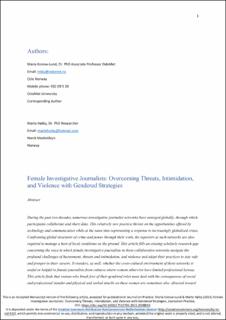| dc.contributor.author | Konow Lund, Maria | |
| dc.contributor.author | Høiby, Marte | |
| dc.date.accessioned | 2022-04-05T13:34:05Z | |
| dc.date.available | 2022-04-05T13:34:05Z | |
| dc.date.created | 2022-01-28T16:23:07Z | |
| dc.date.issued | 2021-12-19 | |
| dc.identifier.issn | 1751-2786 | |
| dc.identifier.issn | 1751-2794 | |
| dc.identifier.uri | https://hdl.handle.net/11250/2989988 | |
| dc.description.abstract | During the past two decades, numerous investigative journalist networks have emerged globally, through which participants collaborate and share data. This relatively new practice thrives on the opportunities offered by technology and communication while at the same time representing a response to increasingly globalized crises. Confronting global structures of crime and power through their work, the reporters at such networks are also required to manage a host of local conditions on the ground. This article fills an existing scholarly research gap concerning the ways in which female investigative journalists in these collaborative networks navigate the profound challenges of harassment, threats and intimidation, and violence and adapt their practices to stay safe and prosper in their careers. It wonders, as well, whether the cross-cultural environment of these networks is useful or helpful to female journalists from cultures where women otherwise have limited professional leeway. This article finds that women who break free of their gendered roles must deal with the consequences of social and professional slander and physical and verbal attacks on these women are sometimes also directed toward male family members in their stead. The journalists interviewed for this study brought expertise from Africa, India, Europe, the Middle East, and Australia. | en_US |
| dc.description.sponsorship | This work was supported by European Union’s Horizon 2020 research and innovation program under the Marie Skłodowska-Curie grant agreement No. 746899. | en_US |
| dc.language.iso | eng | en_US |
| dc.publisher | Routledge | en_US |
| dc.relation.ispartofseries | Journalism Practice; | |
| dc.rights | Attribution-NonCommercial-NoDerivatives 4.0 Internasjonal | * |
| dc.rights.uri | http://creativecommons.org/licenses/by-nc-nd/4.0/deed.no | * |
| dc.subject | Threats | en_US |
| dc.subject | Intimidation | en_US |
| dc.subject | Violence | en_US |
| dc.subject | Genders | en_US |
| dc.subject | Gendered strategies | en_US |
| dc.subject | Female investigative reporters | en_US |
| dc.title | Female Investigative Journalists: Overcoming Threats, Intimidation, and Violence with Gendered Strategies | en_US |
| dc.type | Peer reviewed | en_US |
| dc.type | Journal article | en_US |
| dc.description.version | publishedVersion | en_US |
| cristin.ispublished | true | |
| cristin.fulltext | original | |
| cristin.qualitycode | 1 | |
| dc.identifier.doi | https://doi.org/10.1080/17512786.2021.2008810 | |
| dc.identifier.cristin | 1992813 | |
| dc.source.journal | Journalism Practice | en_US |
| dc.source.pagenumber | 18 | en_US |
| dc.relation.project | Horisont 2020: EC/H2020/746899 | en_US |

